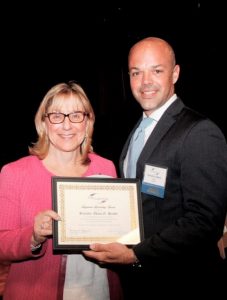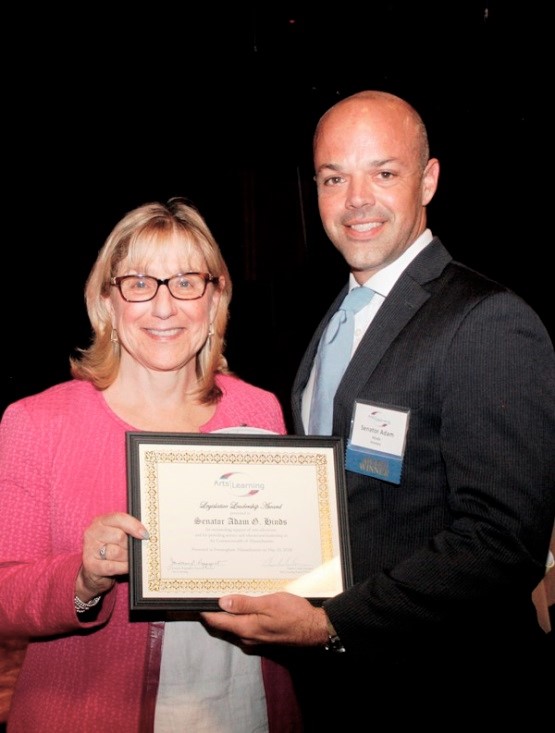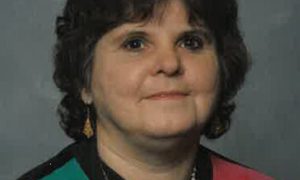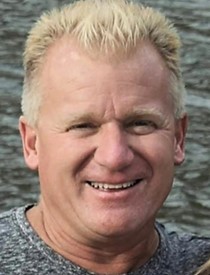
Senate President Karen Spilka presents Senator Adam Hinds with the 2018 Arts|Learning Legislative Leadership Award in May. (Credit: Office of Senator Hinds)
HILLTOWNS – State Senator Adam G. Hinds (D- Pittsfield) announced recently that he has been appointed to co-chair the newly created Special Commission on Improving Efficiencies in Student Transportation by Senate President Karen E. Spilka (D- Ashland).
“It really is an issue that impacts every single school district,” Hinds said. He said there are several pots of money that are being short-changed, some of which are being addressed by the commission to study changes in the Foundation assessments. But, he said, a few others are below the radar, including Special Education Circuit Breaker and school transportation.
The Special Commission is charged with making recommendations to the General Court’s Joint Committee on Education on how school districts can improve and implement efficiencies in regards to various student transportation issues, such as: students attending regional schools; students in special education out of district placements; students attending out of district vocational and technical schools; students attending out of district agricultural schools; and any other student transportation the Commission deems appropriate.
Hinds will be joined on the Commission by State Representative Brad Hill (R- Ipswich), who was appointed by the House Minority Leader and Superintendent Brian Forget of the Triton Regional School District, who was appointed by the Senate Minority Leader. In total, there are 11 members of the Special Commission, to be appointed by the Speaker of the House of Representatives, the Senate President, the House and Senate Minority Leaders, the Secretary of Education, the Commissioner of the Department of Elementary and Secondary Education (DESE) and the Governor.
Currently, the School Transportation Commission is still waiting for the last appointments to start the study, which must be completed by Dec., 2019. Hinds said they plan to hold five public meetings, and to look at best practices from other states. He said there will most certainly be meetings in Western Mass. “It’s the benefit of having a legislator from out here as co-chair,” Hinds said.
Hinds said he recognizes the importance of the transportation issue to Western Mass districts, “It may not be the type of issue in the front of everyone’s minds,” he said, adding that it is to superintendents, School Committees, and town officials, especially in regional school districts.
“Any time you can get more information and more facts out there, it’s helpful,” said Gateway Regional Superintendent Dr. David P. Hopson on the commission’s creation. He said one outcome he hopes to see is a commitment from the Commonwealth to a consistent reimbursement formula. This year, regional school transportation was reimbursed at 80%; but it has been as low as 60% in recent years.
“It wreaks havoc on the budget process, not knowing in advance,” Hopson said. While the district and town officials have been lobbying for the 100% reimbursement that was promised decades ago when schools were encouraged to regionalize; Hopson said a consistent rate of 80% or 90% might be easier to achieve.
Hopson also said the Commonwealth should put something in the budget to reward schools who are saving money in transportation. He said currently there is no incentive. If his district saves $45,000 in transportation costs through better planning; they receive that much less from the state the following year. “The state doesn’t incentivize the efficiencies,” Hopson said.
Hopson also said the work on changing the Foundation assessment, which went up to the eleventh hour in the legislature but then missed the deadline for this year’s budget, won’t impact rural schools. “For Gateway and a number of schools with declining enrollments, the Foundation budget fix won’t get us any more Chapter 70 funding,” Hopson said, adding that about 200 schools across the Commonwealth are in that position.
“It feels like the patience has run out for another fiscal year without seriously reforming the Foundation budget,” Hinds said about the failure of the legislature to sign the Foundation Commission’s changes by the end of the budget debate. He said he believes it will be accomplished this year.
Hinds said what did get accomplished this year was sparsity aid to rural districts of $1.5 million, $1 million of which went to the four western counties. He said the Western Mass delegation had originally proposed $9 million, $300 per student in districts with less than 35 students per square miles. “Now it’s $100 per student in districts with 10 students or less per square mile, in communities below per capita income. Both Hinds and Hopson said they hope that will be a starting point to increase in the future.
“I think Senator Hinds is a great person to have in that position,” Hopson said, adding, “He understands the issue better than so many others, seeing he has so many of us in his district.”








